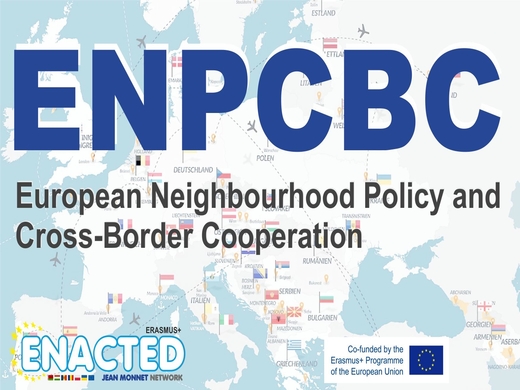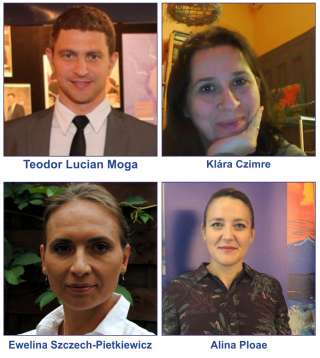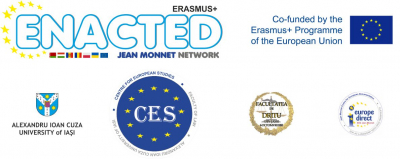


The European Neighbourhood Policy and Cross-Border Cooperation
Center for European Studies, Alexandru Ioan Cuza University of Iasi
Teodor Lucian Moga, Czimre Klára, Ewelina Szczech-Pietkiewicz, Alina Ploae
About
General Course Information
Hi, everyone and welcome to our MOOC on “European Neighbourhood Policy and Cross-border cooperation”! We are very happy to announce the launch of this new online course which seeks to unpack interesting facts, theoretical and practical issues and some of the current challenges the EU’s neighbourhood is experiencing, by and large, and post-Soviet Eastern Europe, in particularly. We will be embarking on a study journey which departs from a theoretical account of the political, economic and security developments unfolding in the neighbourhood in the past couple of years and reaches practical recommendations on how the EU could strengthen ties with the neighbouring countries. We really hope you will have an enjoyable study experience!
The European
Neighbourhood Policy (ENP) has increased the reach and clout of the EU beyond
its borders into the immediate vicinity. Yet, the EU vs. non-EU discrepancies
at the economic and political level are still very much visible in the eastern
borderlands of the EU which comprise areas of land under the jurisdiction of
both the EU and the Eastern Partnership (EaP) states. Thus, in line with the
2015 ENP Review and the subsequent 2016 Global Strategy for the EU’s Foreign
and Security Policy (EUGS), which both emphasised the urgent need for
reconsideration of the EU’s neighbourhood and external instruments, the role of
borderland regions has also been seen as prominent for enhancing cooperation
between Eastern European EU and non-EU members and for strengthening regional
stability and security.
This course addresses all students interested to
enhance their knowledge in issues ranging from the EU’s actorness, the ENP and
the EaP to cross-border cooperation.
This MOOC aims at equipping students, young professionals, civil society representatives, public servants, etc. with basic knowledge and practical experience in the (geo)political, economic and social processes occurring in European Union (EU)’s eastern neighbourhood.
Content
Course Content
The course it structured in five units: The five units course consist of:
- Chapter summaries and key readings prepared by international experts from the EU-related institutions, academia and civil society;
- Video lectures and power point presentations prepared by the experts;
- Quiz questions to help the course participants to reflect on the knowledge received through the lectures and provide assessment.
What will I learn?
Unit 1: Theoretical conceptualization of the EU actorness internationally and in the Eastern neighbourhood
Brief overview: The rising great power competition between the West and Russia, with the ongoing volatility in the EU’s neighbourhood (both in the post-Soviet space and in Middle East and North Africa region), are seriously testing the EU’s ability to stand up to the global and regional challenges. Particularly in the eastern neighbourhood the EU’s actorness and neighbourhood instruments appear to be under strain. The EU’s concerns with pressing internal issues, the precarious state of affairs the six Eastern Partnership (EaP) countries are currently facing in political, economic, social, security matters, coupled with Russia’s increasing assertiveness challenge the EU’s presence in the neighbourhood and the capacity to wield actorness. This course unit seeks to equip the students with the capacity to understand, associate and critically reflect upon the concepts which theoretically underpin the EU’s external capacity to influence the present international context (in other words, to exercise actorness) and to diffuse its unique normative frameworks as prerequisites for prosperity, peace and stability both regionally and worldwide.
Unit 2: The EU’s foreign policy instruments in the eastern neighbourhood: ENP & EaP
Brief overview: The European Neighbourhood Policy (ENP) has been designed to increase the reach and clout of the European Union (EU) beyond its borders into the immediate vicinity and to formally establish political and economic cooperation with the neighbours. In Eastern Europe, this political initiative has been followed by the Eastern Partnership (EaP), a multilateral framework specifically dedicated to strengthening relations with the post-Soviet space. In line with the latest events in the region spearheaded by turmoil in Ukraine and the increasing geopolitical completion with Russia, the 2015 ENP Review and the subsequent 2016 Global Strategy for the EU’s Foreign and Security Policy (EUGS) emphasised the urgent need for a reconsideration of the EU’s actorness in the eastern neighbourgood towards a more pragmatic and resilient approach. This course unit addresses all students interested to enhance their knowledge in issues related to the ENP’s and the EaP’s contribution to the development of the ties between the EU and the eastern neighbourhood.
Unit 3: General introduction to borders and cross-border co-operations
Brief overview: The terminology related to borders, border regions and cross-border co-operations are explained in detail focusing on their interpretation and use in the European Union. This includes the discussion of the economic, social, cultural and political dimensions as well as the elements of peripherality and multiculturalism in border regions. In addition to the introduction to the various ways of typifying borders and border regions, special attention is paid to the border region typology used in the documents and policies of the European Union. The students will focus on the specific features of cross-border co-operation resulting from the European enlargements and integration processes. The diverse forms of cross-border co-operations (twinning, euroregions, working communities, European Grouping of Territorial Co-operations and project based cross-border co-operations) are introduced to find the best solutions along the borders of the Eastern Partnership countries. The most important objective of the Unit is to provide theoretical assistance for the promotion of cross-border co-operations along the external borders of the European Union.
Unit 4: Transforming borders into opportunity for development
Brief overview: The unit aims to present possible direction of developing a border region, using the border as one of the sources of growth. The logic of the discussion starts with presenting the concept of borders in regional science, where this administrative issue is sometimes neglected. Therefore, territory as an analytical unit is described, which allows to observe economic and social factors and mechanisms in the whole functional area, despite administrational divisions. The idea of transforming borders into development opportunity is presented in economic terms, using economic costs and benefits, and analysing impact on local and regional economy. Cross-border cooperation, as one of the instruments of obtaining these benefits, is also researched from the point of view of economics, i.e. value added of CBC. Further analytical instruments are delivered by concepts created based on empirical observations, such as resourceful region, transfer of knowledge, and cooperative governance. Such examples of conceptualization give grounds to assess region’s approach to border in the opportunity/threat context. This theoretical argument gives ground for a more practical analysis of transforming borders into opportunities in area of region’s/city economy. Cross-border trade is presented in particular as an issue of great impact on border region’s development. Further, a case study of Lublin is described with examples of strategic areas of development towards transforming the city into a metropolis of transnational regional importance.
Unit 5: ENPI – ENI – Joint Operational Programmes at the EU’s eastern border
Brief overview: In this
unit detailed information regarding the management and implementation of the European
Neighbourhood Policy Instrument (ENPI) and European Neighbourhood Instrument (ENI)
cross-border co-operation supporting programmes along the external borders of
the European Union, with special emphasis on the original objectives, priorities
and tasks, is presented. The four
co-operation criteria: joint development, joint implementation, joint staffing
and joint financing that are the main pillars for designing and implementing an
ENPI or ENI cross border cooperation project were highlighted in the text of
the unit and in the presentation. During the presentation of the unit,
practical information regarding the implementation of the Joint Operational
Programme Black Sea Basin 2014-2020, funded from the European Neighbourhood
Instrument - ENI is presented, that was emphasised by the interview with the
representative of the managing authority. Moreover, best practices from the
cross-border cooperation projects implemented in the framework of the Joint
Operational Programme Romania-Ukraine-Republic of Moldova 2007-2013 are
included in the short video prepared by the managing authority for promoting
the results of the programme (the link with the long version of promotion movie
is available in the section of the unit related to further readings).
Furthermore, methods for successful implementation of the ENPI/ENI cross border
cooperation projects, according to sound financial management principle, are available
throughout the presentation, and other practical tools and advices, including tips
for avoidance of errors, were highlighted in the interview with the senior
auditor.
Course Goals
Upon
completing the course students will:
- Understand the complex political and
economic background of Eastern Europe and the wider post-Soviet space
- develop a broad knowledge of the EU’s actorness in Eastern Europe and the
broader post-Soviet space;
- be able to analyse the current conceptual debates
over the Union’s role in the Eastern borderlands;
- understand the
complexities and dynamics of regional and cross-border relations within Europe
and beyond;
- enhance their critical assessment skills by examining various
instruments through which CBC functions;
- be able to understand the role of
Cross-border cooperation as a key priority of the European Neighbourhood
Instruments (ENI);
- be able to identify the opportunities of being a border
region, as well as to operate with key concepts of regional development, such
as periphery, core-periphery model, sustainable development, etc.
Previous Knowledge
There are no pre-requisites for taking the course.
Course Procedure
Depending on the individual pace of learning and the time available, the course can be completed faster.
After studying each unit (course and bibliography, videos), complete the quiz. In order to pass the quiz, it is necessary to score at least 75%. You can answer the quiz maximum 5 times.
Certificate
For actively participating in the course you will receive an automatic certificate which includes your username, the course name as well as the completed lessons. We want to point out that this certificate merely confirms that the user answered at least 75% of the self-assessment questions correctly.Licence
This work is licensed under a Creative Commons Attribution 4.0 International LicenseCourse Instructor

Teodor Lucian Moga, Czimre Klára, Ewelina Szczech-Pietkiewicz, Alina Ploae
Dr. Teodor Lucian Moga, professor in the foreign affairs & security issues at Centre for European Studies (Faculty of Law, Alexandru Ioan Cuza University of Iasi, Romania) and former post-doc researcher at the University of St. Gallen, Switzerland (topic: Geopolitics of the post-Soviet Eastern Europe). He was a holder of the Swiss Government Excellence Scholarship. He previously pursued a PhD in Economics and International Relations at UAIC and a MA in Political Science at the University of Manchester, UK. His main academic fields of interest are EU foreign and security policy, European Neighbourhood Policy and the Eastern Partnership. He pursued relevant research and teaching stints at the European Commission, the British Embassy Bucharest, European Union Institute for Security Studies, Paris, George C. Marshall European Center for Security Studies and Romanian Academy of Science. He has strong expertise in the EaP region (teaching, organising events and designing research projects). Role in the project: he is the coordinator of the project and responsible for the management of the events, for the monitoring of specific activities, budget control, and for the submission of reports on outcomes.
Dr. Klára Czimre, is assistant professor at the Department of Social Geography and Regional Development Planning at the University of Debrecen, Hungary. She has been an active partner in the work of the Institute for Euroregional Studies Oradea since its foundation. As member of the advisory committee of the scientific journal of the Institute, she has been responsible for the edition of two volumes of the Eurolimes (Volumes 12 and 17). She held lectures at the IERS and presentations at conferences organised by the Institute from the start. Her researches focus on cross-border cooperation related issues, with special emphasis on institutional relations, education, theoretical perspectives, EU related topics, etc. Besides the above, her fields of interest also include EU enlargement aspects, international relations (institutional and geographical aspects), real estate management issues and EU policy.
Prof. Ewelina Szczech-Pietkiewicz is PhD in International Economics with the specialization in European Union at the SGH Warsaw School of Economics, Poland; she has various publications and research on competitiveness of EU; current field of studies: urban development, competitiveness of cities. She was involved in cCooperation with various European universities through scholarship programmes (Aarhus University, University of Barcelona, University of Iceland, Glasgow University). She has t eaching experience under Erasmus + programme at: University of Barcelona, Economic University of Bratislava.
Dr Alina Ploae is an
associate trainer at Centre for European Studies (Faculty of Law, Alexandru Ioan Cuza University of Iasi, Romania). She has a PhD in Economics, having as main
academic areas of interest the economic dimension of the ENP. Alina has been
involved within the Centre’s activities since 2013. She has also wide expertise
in EU funds management. Between August 2006 and September 2011 she gained
experience in ENPI programmes management as Contracting Officer for Joint
Operational Programme Romania-Ukraine-Republic of Moldova 2007-2013. In 2012
she coordinated the Unit for Regional Operational Programme 2007-2013 Projects
Monitoring, performing the pre-contracting phase for the projects funded from
ERDF. She also was nominated Head of Unit within the Unit for ERDF and IPA
Expenditure Verification, General Directorate for First Level Control, where
she performed first level control for ERDF and IPA Expenditure of the Romanian
partners involved in the following programmes: INTERREG IVC, URBACT II, ESPON
2013, Southeast Europe, and Central Europe. Starting with 2013 she is being
involved in IPA funds management. Alina participated as a speaker in a variety
of international courses and seminars, and also as a trainer in a TAIEX
workshop.
Login & Enrol Currently: 289 Participants
Free for all € 0.00
Partners
This course was developed within the project European Union and its neighbourhood. Network for enhancing EU’s actorness in the eastern borderlands ENACTED Jean Monnet Network | ERASMUS+ project 2017-2625 (enacted.uaic.ro) coordinated by the Centre for European Studies – Faculty of Law, Alexandru Ioan Cuza University of Iasi, Romania (cse.uaic.ro).
This course was published with the
European Commission support. “The European Commission support for
the production of this publication does not constitute an endorsement of the
contents which reflects the views only of the authors, and the Commission
cannot be held responsible for any use which may be made of the information
contained therein."

Center for European Studies, Alexandru Ioan Cuza University of Iasi
